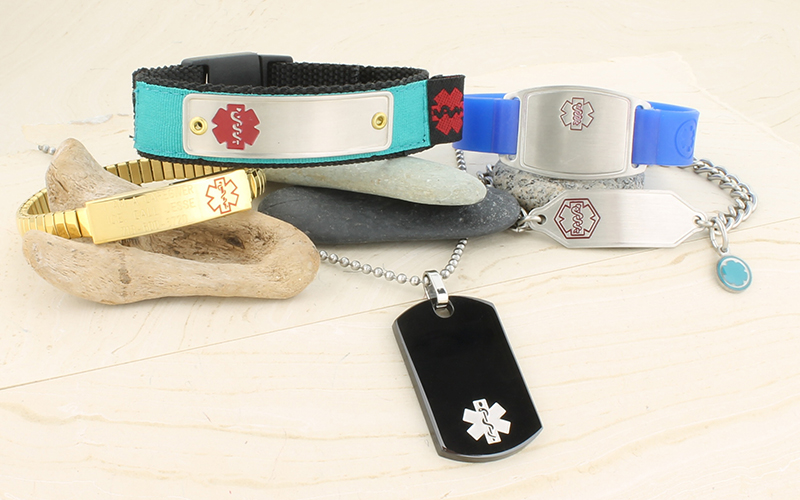Alzheimer’s disease is a type of dementia caused by protein deposits within the brain that lead to a progressive decline in memory, thinking, and reasoning skills. It affects approximately 5.8 million people in the United States, according to the Center for Disease Control and Prevention.
While most of the people who are diagnosed with Alzheimer’s are over 65, some younger people (under age 65) are also diagnosed with early-onset Alzheimer’s disease.
Here’s a quick rundown about the symptoms, diagnosis and treatment processes, how to keep your loved one safe, and medical ID bracelets/safety clasps that are suitable for people with Alzheimer’s.
Symptoms
Symptoms of Alzheimer’s disease can vary from individual to individual and will change as the disease progresses.
Early symptoms can include repetitive statements or questioning (telling the same story repeatedly); forgetting conversations; misplacing items like car keys, phones, or wallets; and becoming lost in familiar settings (like driving to the grocery store or to church). As the disease progresses, symptoms include not recognizing familiar family members, major changes in personality or behavior, difficulty in planning or performing familiar tasks, and difficulty managing finances.
In many cases, long term memories will last longer than short term memories. The individual may retain childhood memories or think that a loved one like a son or daughter is their parent.
Some skills such as reading, telling stories, drawing, playing an instrument, or doing crafts are also retained for longer periods of time.
Diagnosis/Treatment
The first step in the diagnosis process is reporting the symptoms to a medical professional, usually the individual’s primary healthcare provider.
The healthcare provider can perform a variety of cognitive screenings and neurological exams to determine the extent of a client’s symptoms and refer the client to a neurologist if necessary. Imaging such as head MRIs or CT scans and bloodwork can also be helpful in making the diagnosis.
Unfortunately, there is currently no definitive treatment for Alzheimer’s disease. Research is underway to find more effective treatment options. There are several medications that can slow the progression of the disease, and lifestyle changes such as exercise, a healthy diet, regular socialization, and addressing any sensory deficits (with hearing or vision) are also effective.
Keeping Your Loved One Safe
Due to the decline in thinking and reasoning skills and memories, keeping people with Alzheimer’s disease can be extremely difficult. Even if your loved one is confused, it is sometimes more comforting for them if you reinforce their belief rather than attempting to reorient them.
Depending on the specific circumstances and stage of their Alzheimer’s disease, reorientation can be helpful, but it may not be possible for the individual to realize the extent of their confusion.
One of the most dangerous behaviors displayed is wandering. As the disease progresses, the individual can be confused about their whereabouts and may be convinced that they need to go home—even if they are already home.
If they wander, they can be exposed to the elements, fall and injure themselves, or get hit by a vehicle. They may require constant supervision in the later stages of the disease that requires them to enter a specialized care facility such as a memory care unit or to always have a family member/caretaker present.
Medical ID Bracelets/Safety Clasps
In the event that your one does wander, a medical ID bracelet can be key to reuniting them with you.
Information listed should include their name, Alzheimer’s diagnosis and other relevant health conditions, and your contact information, as well as their own address.
Your loved one may be reluctant to wear the bracelet/medical ID or may remove it if they don’t understand why they need to wear it. Familiarity is key to helping them to wear it.
A man who is used to wearing a watch may be more inclined to wear a medical ID that resembles a watch, while a woman who loves jewelry may enjoy wearing a medical ID with the appearance of a fancy bracelet. Certain safety clasps can also make it more difficult for people with Alzheimer’s disease to remove their medical ID.
American Medical ID offers a wide variety of jewelry and medical ID options to help you find the one that is right for your loved one. The friendly customer service representatives can answer any questions that you have via phone or online chat.







